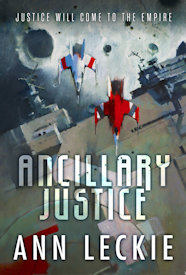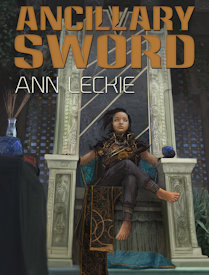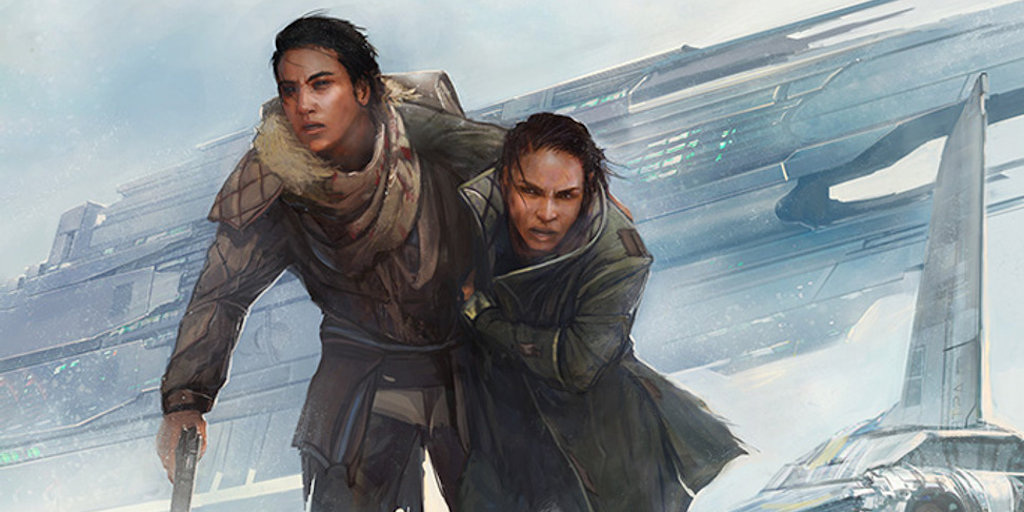The Imperial Radch Series
It’s hard to review these books as the “trilogy” they were marketed as. Ancillary Justice was a phenomenal, riveting novel, but sadly, I can’t say the same of its two sequels.
 I was so excited when Ann Leckie burst onto the sci-fi scene with Ancillary Justice, an intensely engaging, dark, and refreshingly creative space opera that follows the remaining fragment of an intelligent warship called Justice of Toren, embodied by its one surviving “ancillary,” who is on the run and going by the name of Breq. In Leckie’s bleak vision of the future, the Radch empire considers itself the pinnacle of civilization and makes a habit of spreading its so-called sophistication far and wide by annexing (a.k.a. invading, slaughtering, enslaving and assimilating) lesser cultures.
I was so excited when Ann Leckie burst onto the sci-fi scene with Ancillary Justice, an intensely engaging, dark, and refreshingly creative space opera that follows the remaining fragment of an intelligent warship called Justice of Toren, embodied by its one surviving “ancillary,” who is on the run and going by the name of Breq. In Leckie’s bleak vision of the future, the Radch empire considers itself the pinnacle of civilization and makes a habit of spreading its so-called sophistication far and wide by annexing (a.k.a. invading, slaughtering, enslaving and assimilating) lesser cultures.
A shocking number of their unfortunate victims are converted into ancillaries, which means they’re physically killed and implanted with Radchaai technology that links their bodies and minds to the will of various warships. In essence, they’re brutally converted into zombie super soldiers that act as humanoid extensions of spaceships, and Leckie’s description of it all is both intriguing and immensely disturbing.
The story is told on two timelines as it alternates between the past, when Breq was still part of Justice of Toren, and the present, as she navigates remote border worlds and evades the government on a furious suicide mission to destroy the empire’s tyrannical leader. The book is, in a word, fantastic. I was thoroughly engaged from the first page straight through the closing paragraph, and thrilled that it promised to be an incredible series.
 Unfortunately, the sequels did not live up to Leckie’s epic debut. Ancillary Sword, while not bad, was far from the level of its predecessor. It took what was a huge, galaxy-spanning premise and shrank it down to a much smaller, more simplistic story that focused solely on Breq’s new position as captain of her own ship, stuck orbiting a single planet as civil war erupts across the stars beyond. Things happened in this book, and the more intimate exploration of Radchaai culture was interesting overall, so I can’t rate it a complete bust, but the massive change of direction was definitely a letdown after the first novel.
Unfortunately, the sequels did not live up to Leckie’s epic debut. Ancillary Sword, while not bad, was far from the level of its predecessor. It took what was a huge, galaxy-spanning premise and shrank it down to a much smaller, more simplistic story that focused solely on Breq’s new position as captain of her own ship, stuck orbiting a single planet as civil war erupts across the stars beyond. Things happened in this book, and the more intimate exploration of Radchaai culture was interesting overall, so I can’t rate it a complete bust, but the massive change of direction was definitely a letdown after the first novel.
It felt like this huge story Leckie had been building up to just sort of fizzled out and didn’t happen, and was instead replaced by “another day in the galactic neighborhood.” I didn’t dislike it but I was hoping for so much more. Still, I figured it was meant to set the stage for what would undoubtedly be a mind-blowing finale. Boy, was I wrong.
 Ancillary Mercy has to be one of the biggest letdowns in genre history. First of all, the level of repetition is utterly unacceptable. I’m honestly shocked that it made it to print. It got to a point, about halfway through, where every time I saw the word “tea,” my blood pressure would rise a little more. This word occurs an outrageous number of times – without exaggeration, almost every few lines throughout the book. We get it. This civilization is big on drinking tea. They do it 24/7, even in life and death situations. It’s critical to their culture. We don’t need to be told about it multiple times per paragraph. If someone played a drinking game based on the appearance of “tea” in this novel, they’d be dead a quarter of the way through.
Ancillary Mercy has to be one of the biggest letdowns in genre history. First of all, the level of repetition is utterly unacceptable. I’m honestly shocked that it made it to print. It got to a point, about halfway through, where every time I saw the word “tea,” my blood pressure would rise a little more. This word occurs an outrageous number of times – without exaggeration, almost every few lines throughout the book. We get it. This civilization is big on drinking tea. They do it 24/7, even in life and death situations. It’s critical to their culture. We don’t need to be told about it multiple times per paragraph. If someone played a drinking game based on the appearance of “tea” in this novel, they’d be dead a quarter of the way through.
The gender female-default thing is a swing and a miss for me. It was tolerable in the first book, got annoying in the second and at this point is downright insufferable. It may be easier to swallow if Leckie actually offered a reason for it. But such as it is, it comes off as very gimmicky. Is everyone in this culture pansexual? Do these people reproduce artificially? If gender is truly “not a thing,” then what linguistically led them to default to “she” for everything, even referring to male children as “daughters” rather than developing a gender neutral word, as most societies in that position would do? Is this a matriarchy where women are held in higher regard and therefore dominate socially, leading to this quirk of language? None of these questions are even remotely explored, making the whole premise ultimately empty rather than clever or progressive.
Then we come to the story itself – or total lack thereof. This has to be the first sci-fi book I’ve ever read where absolutely nothing happens. 90% of the writing focuses on tea, descriptions of people not wanting to show their emotions and, most frustratingly, romantic relationships between the crew. These people are supposed to be universe-dominating superior soldiers in the middle of an interstellar war. And what do they do? Apparently, they divide the majority of their time between making tea, presenting tea to others, fussing over tea sets and engaging in soap opera level gossip and the drama of romantic entanglements. It’s absurd.
Leckie has shown with Ancillary Justice that she is more than capable of creating a riveting concept with compelling characters and storylines, with a huge world and large-scale ideas as a backdrop. Why she traded that in for books 2 and 3 instead of continuing the successful approach of the first is completely beyond me. Ancillary Sword was a large step down but at least between the Undergarden drama, the plantation revolt, the crew’s discovery of Breq’s true nature, etc. things were actually happening. Sadly, not even that can be said for “the stunning conclusion to the trilogy.” For an author who started out so strong, I’m genuinely mystified by what happened here. However, it doesn’t change the strength of her debut and I still highly recommend reading that one as a standalone novel.








